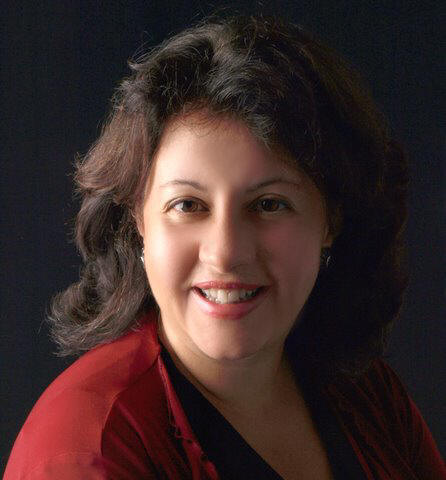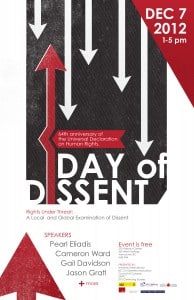Dissent is an indispensable component of a free and democratic society. Yet, across the globe the right to engage in dissent is increasingly threatened. Join us on Friday, December 7th — the 64th anniversary of the Universal Declaration on Human Rights — as we examine the extent to which the right is acknowledged and protected by Canadian and International law.
Presented by: Lawyers’ Rights Watch Canada; Amnesty International; BC Civil Liberties Association; Council of Canadians; and New Media Journalism Program, SFU Continuing Studies.
Register here
Event Outline
Panel 1 – Local
- Leo McGrady QC – Cedar as Sister: Indigenous Law and the Common Law of Civil Disobedience.
- Rueben George and Phil Lane on moves to stifle First Nations opposition
- Cameron Ward: The right to be annoying: Lessons from the front lines, defending activists at Clayoquot Sound, APEC and elsewhere.
- Jason Gratl: Quiet Suppression of Quiet Sedition: Occupy in the Courts
Panel 2 – Global
- Matt Eisenbrandt – Obstacles to Holding Canadian Corporations Accountable for Abuses Abroad
- Gwen Brodsky – The Right to Dissent: Aboriginal
- Gail Davidson – The Right to Dissent: International Law Guarantees
- Fiona Koza – Anti-mining activists experience violence for speaking out
Keynote Speaker:
 Pearl Eliadis B. C. L., LL.B., is a human rights lawyer and lecturer in civil liberties at McGill University, and Full Member of the McGill Centre for human rights and legal pluralism. Pearl will speak about the Voices-Voix Coalition’s work in documenting attacks on civil society in Canada, as well as dissent and advocacy. Organizations whose views do not align with the government of Canada have found themselves vilified in the public sphere as “terrorists”, money launderers and/or as working against Canadian interests.
Pearl Eliadis B. C. L., LL.B., is a human rights lawyer and lecturer in civil liberties at McGill University, and Full Member of the McGill Centre for human rights and legal pluralism. Pearl will speak about the Voices-Voix Coalition’s work in documenting attacks on civil society in Canada, as well as dissent and advocacy. Organizations whose views do not align with the government of Canada have found themselves vilified in the public sphere as “terrorists”, money launderers and/or as working against Canadian interests.
Case studies include approximately 35 reputable and prominent community-based and human rights organizations that have been defunded, a human rights defender placed under government surveillance, and at least three organizations whose charitable status has been attacked. These case studies are used to examine the emerging norms with respect to the enabling of civil society, as well as the impact on freedom of peaceful assembly, freedom of Association, and freedom of expression. The presentation will also examine parallel efforts to eliminate or suppress robust and reliable research in the public sector, knowledge management institutions, and efforts to fire or interfere with independent watchdog institutions and whistleblowers.”

